GDPR, kort för General Data Protection Regulation, är en EU-lag som skyddar användarnas integritet när de använder webbplatser.
Vi har fått dussintals e-postmeddelanden från användare som ber oss förklara GDPR på enkel svenska och dela tips om hur man gör din WordPress-webbplats GDPR-kompatibel.
I den här artikeln förklarar vi allt du behöver veta om GDPR och WordPress (utan det komplicerade juridiska snacket).
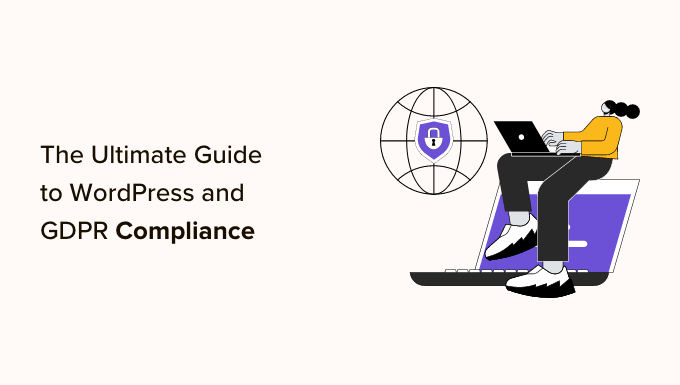
Ansvarsfriskrivning
Vi är inte jurister, och inget på denna webbplats bör betraktas som juridisk rådgivning.
För att hjälpa dig att enkelt navigera genom vår ultimata guide till WordPress och GDPR-efterlevnad, har vi skapat en innehållsförteckning nedan:
- Vad är GDPR?
- Gäller GDPR för min WordPress-webbplats?
- Vad krävs av webbplatsägare enligt GDPR?
- Är WordPress GDPR-kompatibelt?
- Ytterligare områden på din webbplats att kontrollera för GDPR-efterlevnad
- Bästa WordPress-plugins för GDPR-efterlevnad
- Slutliga tankar
- Experthandledningar för att göra din WordPress-webbplats GDPR-kompatibel
- Ytterligare resurser
Vad är GDPR?
General Data Protection Regulation (GDPR) är en lag inom Europeiska unionen (EU) som trädde i kraft den 25 maj 2018. Målet med GDPR är att ge EU-medborgare kontroll över sina personuppgifter och att förändra integritetsstrategin för organisationer över hela världen.
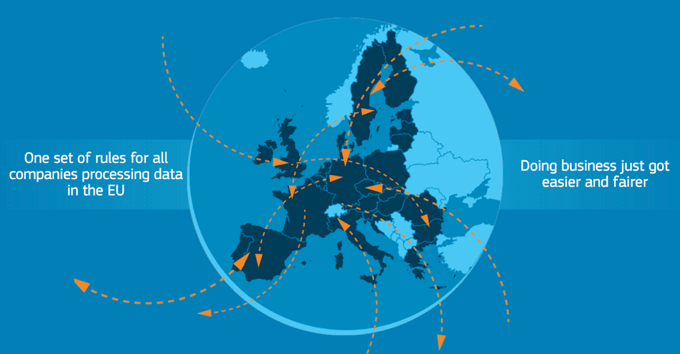
Under åren har du förmodligen fått dussintals e-postmeddelanden från företag som Google om GDPR, deras nya integritetspolicyer och en massa annat juridiskt material. Det beror på att EU har infört stora böter för personer som inte följer reglerna.
Företag som inte följer GDPR:s krav kan drabbas av höga böter på upp till 4 % av ett företags årliga globala intäkter eller 20 miljoner euro (det som är högst). Detta är tillräckligt skäl för att orsaka utbredd panik bland företag runt om i världen.
Vad är CCPA?
Staten Kalifornien införde liknande integritetslagstiftning den 1 januari 2020, även om de potentiella böterna är mycket lägre.
California Consumer Privacy Act (CCPA) är utformad för att skydda personuppgifter för invånare i Kalifornien. Den ger dem rätt att veta vilka personuppgifter som samlas in om dem, begära dess radering och välja bort försäljningen av sina data.
I den här artikeln fokuserar vi på GDPR, men många av stegen vi listar i den här artikeln kommer också att hjälpa dig att bli CCPA-kompatibel.
Detta leder oss till den stora frågan som du kanske funderar på:
Gäller GDPR för min WordPress-webbplats?
Svaret är JA. Det gäller alla företag, stora som små, runt om i världen (inte bara inom Europeiska unionen).
Om din WordPress-webbplats har besökare från EU-länder, då gäller denna lag för dig.
Men tappa inte modet. Det är inte världens undergång.
Även om GDPR kan eskalera till dessa höga bötesnivåer, kommer det att börja med en varning, sedan en tillrättavisning och sedan ett avbrott i databehandlingen.
Och först om du fortsätter att bryta mot lagen kommer de stora böterna att drabba.
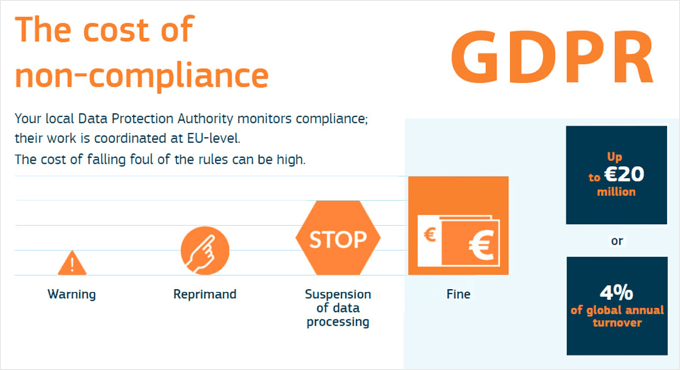
EU är inte någon ond regering ute efter dig. Dess mål är att skydda oskyldiga konsumenter från hänsynslös datahantering som kan leda till ett intrång i deras integritet.
Enligt vår mening är den maximala bötesbeloppet till stor del avsett att få uppmärksamheten från stora företag som Facebook och Google så att denna förordning INTE ignoreras. Dessutom uppmuntrar detta företag att faktiskt lägga mer vikt vid att skydda människors rättigheter.
När du väl förstår vad som krävs av GDPR och lagens anda, då kommer du att inse att inget av detta är för galet.
Vi kommer också att dela verktyg och tips för att göra din WordPress-webbplats GDPR-kompatibel.
Vad krävs av webbplatsägare enligt GDPR?
Målet med GDPR är att skydda användarnas personligt identifierbara information (PII) och ställa högre krav på företag när det gäller hur de samlar in, lagrar och använder denna data.
Dessa personuppgifter inkluderar dina användares namn, e-postadresser, fysiska adresser, IP-adresser, hälsouppgifter, inkomst och mer.
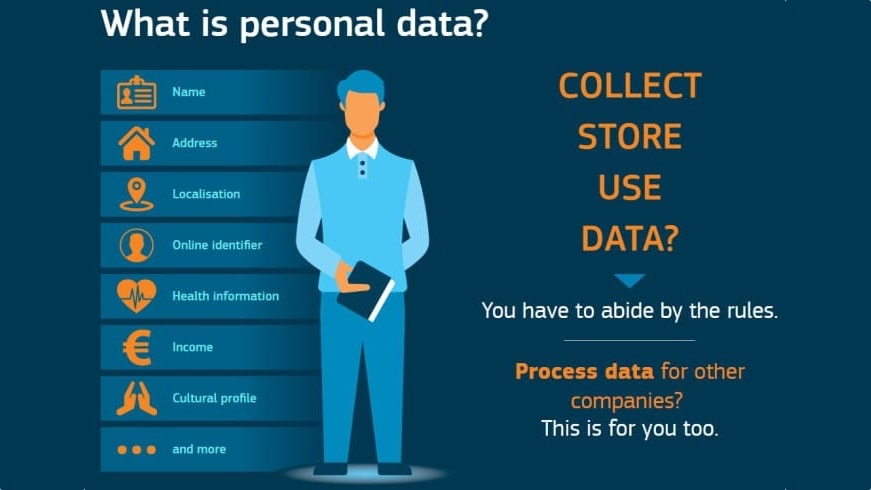
Även om GDPR-förordningen är 200 sidor lång, här är de viktigaste pelarna som du behöver känna till:
Du måste få uttryckligt samtycke för att samla in personlig information
Om du samlar in personuppgifter från en EU-invånare måste du inhämta uttryckligt, specifikt och otvetydigt samtycke eller tillstånd.
Med andra ord kan du inte bara skicka oönskade e-postmeddelanden till någon som gav dig deras visitkort eller fyllde i ditt webbplatsformulär. Detta är spam. Istället måste du låta dem anmäla sig till ditt marknadsföringsnyhetsbrev.
För att det ska anses vara uttryckligt samtycke måste du kräva ett positivt val. Kryssrutan får inte vara förbockad som standard, måste innehålla tydlig formulering (ingen juridisk jargong) och måste vara separat från andra villkor.
Dina användare har rätt till sina personuppgifter
Du måste informera individer om var, varför och hur deras data behandlas och lagras.
En individ har rätt att ladda ner sina personuppgifter och rätten att bli glömd.
Detta innebär att de har rätt att kräva att du raderar deras personuppgifter. När en användare klickar på en avregistreringslänk eller ber dig att radera sin profil, måste du faktiskt göra det.
Du måste ge snabba meddelanden om dataintrång
Organisationer måste rapportera vissa typer av dataintrång till relevanta myndigheter inom 72 timmar, såvida inte intrånget anses ofarligt och inte utgör någon risk för individens data.
Om ett intrång dock är av hög risk, då måste företaget också omedelbart informera de individer som påverkas.
Detta kommer förhoppningsvis att förhindra mörkläggningar som Yahoo, som inte avslöjades förrän vid förvärvet.
Du kan behöva utse en dataskyddsombud
Om du är ett publikt företag eller behandlar stora mängder personlig information, då måste du utse ett dataskyddsombud.
Detta krävs inte för småföretag. Rådgör med en advokat om du är osäker.
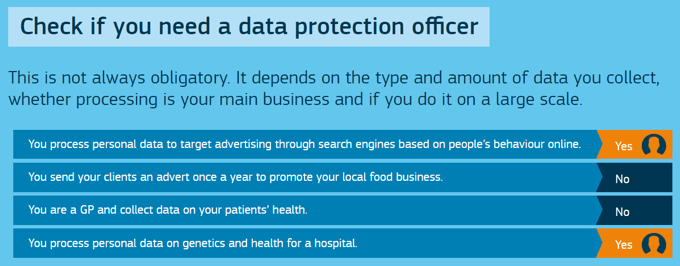
Sammanfattning på enkel svenska av vad som krävs
För att uttrycka det på enkel svenska, ser GDPR till att företag inte kan spam-posta folk genom att skicka dem e-postmeddelanden de inte bett om. Företag kan inte heller sälja folks data utan deras uttryckliga samtycke.
Företag måste radera användarkonton och avregistrera dem från e-postlistor när de blir ombedda. Företag måste också rapportera dataintrång och generellt sett vara bättre på dataskydd.
Låter ganska bra, åtminstone i teorin.
Men du undrar förmodligen vad du behöver göra för att säkerställa att din WordPress-webbplats är GDPR-kompatibel.
Tja, det beror verkligen på din specifika webbplats (mer om detta senare).
Låt oss börja med att besvara den största frågan som vi har fått från användare:
Är WordPress GDPR-kompatibelt?
Ja, WordPress kärnprogramvara har varit GDPR-kompatibel sedan WordPress 4.9.6, som släpptes den 17 maj 2018. Flera GDPR-förbättringar lades till för att uppnå detta.
Det är viktigt att notera att när vi pratar om WordPress, menar vi självhostad WordPress.org. Detta skiljer sig från WordPress.com, och du kan lära dig skillnaden i vår guide om WordPress.com vs. WordPress.org.
Med det sagt, på grund av webbplatsers dynamiska natur kan ingen enskild plattform, plugin eller lösning erbjuda 100 % GDPR-efterlevnad. Processen för GDPR-efterlevnad varierar beroende på vilken typ av webbplats du har, vilken data du lagrar och hur du behandlar data på din webbplats.
Okej, så du kanske tänker, vad betyder det här på klar svenska?
Som standard kommer WordPress med följande verktyg för GDPR-förbättring:
Samtyckes-checkbox för kommentarer
Före maj 2018 lagrade WordPress som standard kommentatorns namn, e-postadress och webbplats som en cookie i användarens webbläsare. Detta gjorde det enklare för användare att lämna kommentarer på sina favoritbloggar eftersom dessa fält var förifyllda.
På grund av GDPR:s krav på samtycke har WordPress lagt till en samtyckesruta till kommentarsformuläret.

Användaren kan lämna en kommentar utan att kryssa i denna ruta. De måste dock manuellt ange sitt namn, e-postadress och webbplats varje gång de gör det.
Tips: Se till att du är utloggad när du testar för att se om kryssrutan finns där.
Om kryssrutan fortfarande inte visas, är det troligt att ditt tema åsidosätter standardkommentarsformuläret i WordPress. Här är en steg-för-steg-guide om hur du lägger till en GDPR-kommentar-integritets-kryssruta i ditt WordPress-tema.
Funktioner för export och radering av personuppgifter
WordPress erbjuder webbplatsägare de verktyg de behöver för att följa GDPR:s krav på datahantering och uppfylla användarnas begäran om export av personuppgifter samt borttagning av användares personuppgifter.
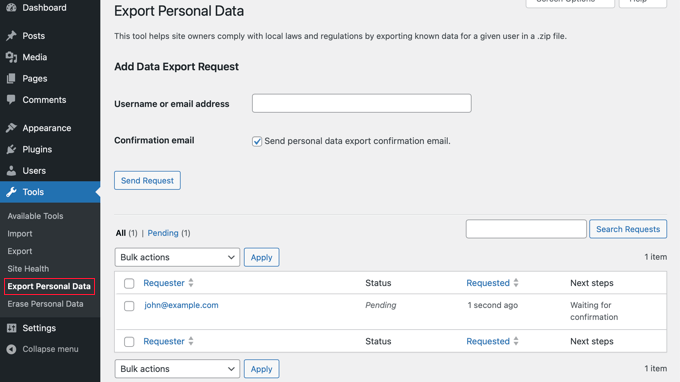
Datahanteringsfunktionerna finns under menyn Verktyg i WordPress-admin. Härifrån kan du gå till Exportera personuppgifter eller Radera personuppgifter.
Generera integritetspolicy
WordPress levereras med en inbyggd generator för integritetspolicy. Den har en färdig mall för integritetspolicy och ger dig vägledning om vad mer du ska lägga till. Detta hjälper dig att vara mer transparent med användarna när det gäller vilken data du lagrar och hur du hanterar deras data.
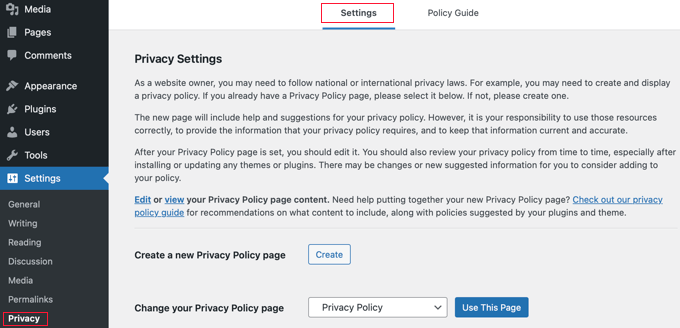
Du kan läsa mer i vår guide om hur man skapar en integritetspolicy i WordPress.
Dessa tre funktioner räcker för att göra en standard WordPress-blogg GDPR-kompatibel. Din webbplats kommer dock sannolikt att ha ytterligare områden som också måste vara i enlighet med reglerna.
Ytterligare områden på din webbplats att kontrollera för GDPR-efterlevnad
Som webbplatsägare kan du använda olika WordPress-plugins som lagrar eller behandlar data, och dessa kan påverka din GDPR-efterlevnad. Vanliga exempel inkluderar:
Beroende på vilka WordPress-plugins du använder på din webbplats måste du agera därefter för att säkerställa att din webbplats är GDPR-kompatibel.
Många av de bästa WordPress-pluginsen har lagt till funktioner för GDPR-förbättringar. Låt oss titta på några av de vanliga områden som du behöver ta itu med.
Google Analytics
Liksom de flesta webbplatsägare använder du förmodligen Google Analytics för att få statistik över webbplatsen. Det innebär att du kan samla in eller spåra personuppgifter som IP-adresser, användar-ID, cookies och andra data för beteendeprofilering.
För att vara GDPR-kompatibel måste du göra ett av följande:
- Anonymisera data innan lagring och bearbetning påbörjas.
- Lägg till ett överlägg som meddelar om cookies och ber användare om samtycke innan spårning.
Båda dessa är ganska svåra att göra om du bara klistrar in Google Analytics-kod manuellt på din webbplats. Men om du använder MonsterInsights, det mest populära Google Analytics-pluginet för WordPress, då har du tur.
De har släppt en EU-compliance-tillägg som hjälper till att automatisera ovanstående process.

MonsterInsights har också ett mycket bra blogginlägg som handlar om GDPR och Google Analytics. Detta är ett måste att läsa om du använder Google Analytics på din webbplats.
Kontaktformulär
Om du använder ett kontaktformulär i WordPress, då kan du behöva lägga till extra transparensåtgärder. Detta gäller särskilt om du lagrar formulärinlägg eller använder data för marknadsföringsändamål .
Här är några saker att tänka på när du gör dina WordPress-formulär GDPR-kompatibla:
- Få uttryckligt samtycke från användare för att lagra deras information.
- Få uttryckligt samtycke från användare om du planerar att använda deras data för marknadsföringsändamål, till exempel att lägga till dem i din e-postlista.
- Inaktivera spårning av cookies, användaragent och IP för formulär.
- Följ begäran om datadelning.
- Om du använder en SaaS-formulärlösning, se till att du har ett databehandlingsavtal med dina formulärleverantörer.
Den goda nyheten är att du inte behöver organisera ett databehandlingsavtal om du använder ett WordPress-plugin som WPForms, Gravity Forms eller Ninja Forms.
Dessa plugins lagrar dina formulärinlägg i din WordPress-databas, så för att vara GDPR-kompatibel behöver du bara lägga till en samtyckesruta med en tydlig förklaring.
WPForms, kontaktformulärspluggen vi använder på WPBeginner, har flera GDPR-förbättringar för att göra det enkelt för dig att lägga till ett GDPR-samtyckesfält, inaktivera användarcookies, inaktivera insamling av användar-IP och inaktivera inlägg med ett enda klick.
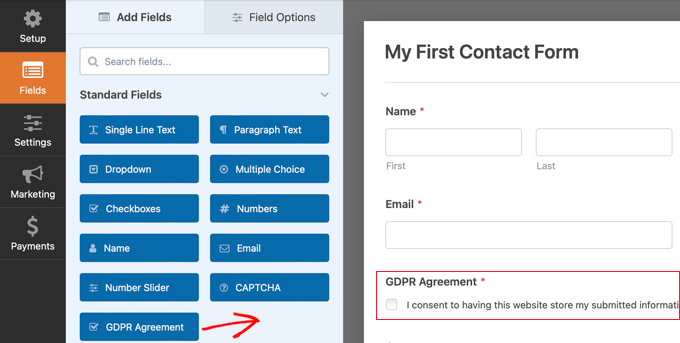
Du kan se vår steg-för-steg-guide om hur man skapar GDPR-kompatibla formulär i WordPress.
E-postmarknadsföringens anmälningsformulär
Liknande kontaktformulär, om du har några formulär för e-postmarknadsföring där användare kan anmäla sig, som popup-fönster, flytande fält, inbäddade formulär och andra, måste du se till att du får uttryckligt samtycke från användarna innan du lägger till dem i din lista.
Detta kan göras antingen genom:
- Lägg till en kryssruta som användaren måste klicka på före opt-in.
- Kräv helt enkelt dubbel opt-in till din e-postlista.
Topplösningar för leadgenerering som OptinMonster har lagt till GDPR-samtyckescheckboxar och andra nödvändiga funktioner för att hjälpa dig att göra dina e-postanmälningsformulär kompatibla.
Du kan läsa mer om GDPR-strategier för marknadsförare på OptinMonster-bloggen.
E-handel och WooCommerce-butiker
Om du använder WooCommerce, det mest populära e-handelspluginet för WordPress, då måste du se till att din webbplats följer GDPR.
Lyckligtvis har MonsterInsights-teamet förberett en djupgående guide om hur man gör en WooCommerce-butik GDPR-kompatibel.
Retargeting-annonser
Om din webbplats kör retargeting-pixlar eller retargeting-annonser, då behöver du inhämta användarens samtycke.
Du kan göra detta genom att använda ett plugin som WPConsent. Det blockerar alla spårningsskript tills användarna ger sitt tillstånd, till skillnad från grundläggande cookie-meddelanden som bara visar en varning.

Pluginet hanterar populära tjänster som Google Analytics och Facebook Pixel samtidigt som det sparar detaljerade samtyckesregister, så att du kan köra dina marknadsföringskampanjer med vetskapen om att du är helt compliant.
Du kan hitta detaljerade instruktioner i vår guide om hur du lägger till ett cookie-meddelande i WordPress för GDPR/CCPA.
Google Fonts
Google Fonts är ett utmärkt sätt att anpassa typografin på din WordPress-webbplats.
Google Fonts har dock visat sig bryta mot GDPR-reglerna. Det beror på att Google loggar dina besökares IP-adress varje gång ett typsnitt laddas.
Lyckligtvis finns det några sätt att hantera detta så att din webbplats är GDPR-kompatibel. Du kan till exempel ladda dina typsnitt lokalt, ersätta Google Fonts med ett annat alternativ eller inaktivera dem.
Du kan lära dig hur i vår guide om hur man gör Google Fonts integritetsvänligt.
Bästa WordPress-plugins för GDPR-efterlevnad
Det finns flera WordPress-plugins som kan hjälpa dig att automatisera delar av GDPR-efterlevnaden.
Dock kan inget plugin erbjuda 100 % efterlevnad på grund av webbplatsers dynamiska natur.
Akta dig för alla WordPress-plugins som påstår sig erbjuda 100 % GDPR-efterlevnad. De vet troligen inte vad de pratar om, och det är bäst för dig att helt undvika dem.
Nedan är vår lista över rekommenderade plugins för GDPR-efterlevnad:
- WPConsent blockerar automatiskt alla spårningsskript tills besökare ger tillstånd, håller detaljerade register över användares samtycke och inkluderar lättanpassade integritetsbanderoller för att hålla din webbplats kompatibel. Det finns också en gratis version av WPConsent tillgänglig.
- Om du använder Google Analytics, rekommenderar vi att du använder MonsterInsights och aktiverar deras EU-kompatibilitets-tillägg.
- WPForms är det mest användarvänliga WordPress-kontaktformulärpluginet och erbjuder GDPR-fält, en automatisk raderingsfunktion för gamla inlägg och andra integritetsverktyg.
- Cookie Notice är ett populärt gratis plugin för att lägga till en EU-cookie-notis, och det integreras väl med toppplugins som MonsterInsights och andra.
- GDPR Cookie Consent låter dig skapa en meddelandefält på din webbplats så att användaren kan bestämma om de vill acceptera eller avvisa cookies och täcker CCPA såväl som GDPR.
- WP Frontend Delete Account är ett gratis plugin som låter användare automatiskt radera sin profil på din webbplats.
- OptinMonster är avancerad programvara för leadgenerering som erbjuder smarta riktningsfunktioner för att öka konverteringar samtidigt som den är GDPR-kompatibel.
- PushEngage låter dig skicka riktade push-meddelanden till besökare efter att de har lämnat din webbplats och är helt GDPR-kompatibel.
- Smash Balloon ger dig ett GDPR-kompatibelt sätt att bädda in liveflöden och visa inlägg från Facebook, Twitter, Instagram, YouTube, TripAdvisor och mer.
- Novashare erbjuder ett sätt för användare att dela ditt innehåll på sociala medier utan att samla in deras personuppgifter eller placera cookies.
Du hittar fler alternativ i vårt expertval av de bästa WordPress GDPR-plugins för att förbättra efterlevnaden.
Vi kommer att fortsätta att övervaka plugin-ekosystemet för att se om några andra WordPress-plugins sticker ut och erbjuder betydande GDPR-kompatibilitetsfunktioner.
Slutliga tankar
GDPR har varit i kraft sedan maj 2018.
Kanske har du haft din WordPress-webbplats ett tag och arbetat mot GDPR-efterlevnad. Eller så kanske du precis har börjat med en ny webbplats.
Oavsett vilket finns det ingen anledning till panik. Fortsätt bara att arbeta mot efterlevnad och få det gjort så snart som möjligt.
Du kanske är orolig för de höga böterna. Kom ihåg att risken att få böter är minimal. Europeiska unionens webbplats anger att du först får en varning, sedan en tillrättavisning, och böter är det sista steget om du inte följer lagen och medvetet ignorerar den.
Kom ihåg att EU inte är ute efter dig. De gör detta för att skydda användardata och återställa människors förtroende för onlineföretag.
I takt med att världen blir digital behöver vi dessa standarder. Med de senaste dataintrången hos stora företag är det viktigt att dessa standarder anpassas globalt.
Det kommer att vara bra för alla inblandade. Dessa nya regler kommer att bidra till att öka konsumenternas förtroende och i sin tur hjälpa till att växa din verksamhet.
Vi hoppas att den här handledningen hjälpte dig att lära dig hur du blir GDPR-kompatibel på din WordPress-blogg. Du kanske också vill se våra experthandledningar om hur du gör din webbplats GDPR-kompatibel.
Experthandledningar för att göra din WordPress-webbplats GDPR-kompatibel
- Hur man lägger till en GDPR-kommentarsekvitensruta i WordPress
- Hur man lägger till ett cookie-popup i WordPress för GDPR/CCPA
- Hur du vet om din WordPress-webbplats använder cookies
- Hur man skapar GDPR-kompatibla formulär i WordPress
- Hur man håller personligt identifierbar information utanför Google Analytics
- Hur du gör Google-typsnitt integritetsvänliga
- Hur du inaktiverar Google-typsnitt på din WordPress-webbplats
- Hur man lägger till en integritetspolicy i WordPress
- Hur du skapar en sida för att inte sälja min information i WordPress
Om du gillade den här artikeln, prenumerera då på vår YouTube-kanal för WordPress-videoguider. Du kan också hitta oss på Twitter och Facebook.
Juridiskt friskrivning
Vi är inte jurister, och inget på denna webbplats bör betraktas som juridisk rådgivning. På grund av webbplatsers dynamiska natur kan inget enskilt plugin eller plattform erbjuda 100 % laglig efterlevnad.
Om du är osäker är det bäst att konsultera en specialist på internetjuridik för att avgöra om du följer alla tillämpliga lagar för dina jurisdiktioner och dina användningsfall.
Ytterligare resurser
- GDPR-hysteri Del I och Del II av Jacques Mattheij
- Dataskyddsinfografik från Europeiska kommissionen
- Principer för GDPR från Europeiska kommissionen
- GDPR och MonsterInsights – allt du behöver veta om Google Analytics GDPR-efterlevnad
- GDPR-förbättringsfunktioner för WPForms – allt du behöver veta om GDPR-efterlevnad för dina WordPress-formulär
- WooCommerce och GDPR – allt du behöver veta om GDPR-efterlevnad för din onlinebutik
- OptinMonster och GDPR – allt du behöver veta om GDPR-efterlevnad och e-postmarknadsföringens opt-in-formulär
Om du gillade den här artikeln, prenumerera då på vår YouTube-kanal för WordPress-videoguider. Du kan också hitta oss på Twitter och Facebook.





Abin
Det verkar vara en långdragen process att korrigera alla kontroller mot varje klausul, har vi något plugin tillgängligt för att göra korrigeringar över hela WordPress-bloggen?
Prithvi Raj
Detta är omöjligt att upprätthålla.
Vem ska gå runt och kontrollera om varje enskild sida följer detta?
Vad ska nybörjare webbplatsägare göra?
Det är tillräckligt svårt att skapa en webbplats och få några personer att komma och läsa, och nu måste du också hantera skräp som detta?
För att uttrycka det enkelt, EU avsåg att stora jättar som Google och FB inte ska mixtra med data.
Denna lag är inte för den genomsnittlige Joe. Det finns hundratals lagar som vanliga människor bryter mot varje dag genom att besöka enkla webbplatser och göra enkla saker online. Ingen kan upprätthålla lagar som GDPR mot småföretagare.
Om du blir stor, måste du definitivt följa reglerna, det är också vettigt, om du är större har du mer resurser.
Prithvi
Jag tvivlar på om denna GDPR kan verkställas för småföretag, planerar EU att gå efter varje enskild liten webbplats?
Jag är inte baserad i EU, denna förordning gäller inte mig, åtminstone inte på denna nivå (jag är ett litet företag).
Även om det gäller, kan jag inte göra några ändringar för varje enskild reglering som uppstår i olika länder.
Jag skulle vilja se hur detta utvecklas över åren, det är främst avsett för jättar, inte för vanliga människor.
Jeanne
Tack för artikeln! Jag är glad att veta att WP är helt med på detta ämne.
Geoff
Ginger-pluginet fungerar, det är enkelt att använda och blockerar tredjepartscookies om användaren inte vill acceptera cookies men ändå se webbplatsen i fråga.
Christophe Huget
Hej, jag använder Iubenda för att hantera min integritetspolicy, sidan finns inte fysiskt på vår webbplats, den är värd på Iubenda.com. Det finns inget alternativ att lägga till en länk till en extern länk.
owolabi Thankgod
Jag fick ett meddelande från Google att jag skulle logga in på mitt AdSense-konto och acceptera deras nya integritetspolicy och det har jag gjort
Är detta samma som GDPR eftersom jag blir alltmer förvirrad efter att ha läst den här artikeln
Vad ska jag göra för att göra min WordPress-sida GDPR-kompatibel eftersom jag personligen inte har gjort något alls.
Guust
Artikeln säger att det finns böter för företag, så vad händer om min verksamhet inte drivs av ett företag?
Och vad gäller hobbywebbplatser och bloggar, alltså icke-affärswebbplatser?
Antingen är artikeln inte komplett eller vilseledande?
Kan du klargöra?
Tack
Nanette Irvine
Tack för din informativa artikel. Jag har en fråga angående en blogg jag skriver. Jag har en självhostad Wordpress-sida med ett Divi-tema. Det är inte ett företag, ingen marknadsföring, inga annonser – bara att dela en personlig resa. Jag erbjuder folk möjligheten att få ett meddelande när nästa inlägg kommer upp. Deras namn och e-postadress lagras i Aweber. Måste jag ha en integritetsmeddelande etc. för GDPR-efterlevnad?
Mamun
Mycket informativ artikel. Verkligen jag var förvirrad över termen GDPR. Nu är det klart för mig... Tack kompis
Bill
Jag håller inte med om att anta att EU kan diktera för ett företag utan fysisk plats i ett EU-land. Detta är en suveränitetsfråga som de flesta amerikanska medborgare skulle ha problem med, liknande te-skatten som i princip startade de amerikanska koloniernas kamp för självständighet. EU kan inte globalt kriminalisera en handling de inte gillar och straffa en amerikansk medborgare, eller annan medborgare utanför deras maktområde, baserat på en sådan handling. Att säga att de kan det är höjden av socialistisk arrogans.
Inte heller har EU jurisdiktion över internet. Om de inte gillar hur resten av världen gör affärer är de fria att låsa in sina bortskämda medborgare i en låtsasvärld, mycket likt kineserna gör.
JC
Sant, men då finns det DMCA som är en amerikansk lag utformad för att skydda upphovsrätt som folk också följer oavsett suveränitet. Och amerikaner verkar inte kämpa med att betala skatt utomlands även när deras fysiska plats och anställning inte faller under amerikansk jurisdiktion.
Geoff
Naturligtvis kan EU kriminalisera vissa handlingar globalt.
För närvarande – Försäljning av illegala varor till EU kan göras olaglig och varje EU-polismyndighet kan gripa personer för vissa handlingar som utförs av personer som reser in i EU.
Poängen är att detta är ett steg mot att skydda data för alla som vistas inom EU (även icke-EU-medborgare). Om en USA-baserad organisation släpper data som är personlig för mig för egen vinning eller för att de inte skyddade den ordentligt – borde de straffas.
Nathan
Ja! Jag trodde jag var den enda som tänkte så här. Finns det ett juridiskt prejudikat för något sådant? En medborgare från EU besöker min webbplats och plötsligt har de rätt att lagstifta om vad jag får och inte får göra? Jag tror att alla hoppar på GDPR-tåget för att det innebär mer arbete (dvs. mer pengar) för utvecklare. Är någon annan villig att bara säga att kejsaren inte har några kläder på sig?
Tony Tremblay
Jag tror inte att de kommer att jaga någon utanför eurozonen. Vad de däremot skulle kunna göra är att tvinga Google att integrera dem i rankingfaktorerna för sökmotorer. På så sätt kan varje webbplats påverkas...
John
Kan vi välja att blockera affärer i Europa? Det skulle finnas Noll anledning för mig att ens komma dit... Jag vill inte ens ha deras pengar!
Magrt
Tyvärr är det fler problem för dig.
Uppenbarligen har EU en regel som träder i kraft i år och som förbjuder geoblockering. Jag är ingen jurist, men i grund och botten kommer den regeln att hindra dig från att blockera EU-medborgare från din webbplats och leda till böter.
Bill
Ja John, du kan absolut blockera all EU-baserad trafik och glömma hela röran.
Latunde
Tack för att du delade denna fantastiska information
GeeLew Grinds Carpentier
GDPR-förståelse är verklig just nu
Amanda
Hej, tack så mycket till er alla, redaktionen, för den här underbara och hjälpsamma artikeln, med alla hjälpsamma länkar och resurser!! Och jag är så tacksam över att se ett mestadels positivt och tacksamt svar från vårt fantastiska community av bloggare. Jag är så stolt över att vara en del av detta. Och jag älskar verkligen ert respektfulla bemötande av "lagen andemening".
Joe
Detta var fantastiskt! Jag önskar bara att det inkluderade AdSense, eftersom många webbplatsägare använder det också.
nancie
Tack! Har letat efter något enkelt som detta i veckor...
Amar Ilindra
Tack för den detaljerade guiden.
Men jag känner att du missade Google AdSense-delen.
För EU-användare behöver vi få samtycke för personliga/icke-personliga annonser.
Det skulle vara till stor hjälp för människor om du uppdaterar artikeln med de ändringar vi behöver göra med Adsense.
WPBeginner Support
Hej Amar,
AdSense har problem med GDPR-relaterade riktlinjer för utgivare. I grund och botten måste du avslöja dina annonser i integritetspolicyn och cookie-användningen. Du måste visa en cookie-popup för att få användarens samtycke.
Admin
Mike
Vad händer om en persons verksamhet bara är lokal för västra Kanada
Geoff
Om den verksamheten interagerar med en person som är bosatt inom EU – då ja, det gör de.
Lawrence Elliott
Vad sägs om att använda Facebook Comments-pluginet? Är det i enlighet med reglerna? Om inte, hur kan vi göra det så?
WPBeginner Support
Hej Lawrence,
Alla Facebook-inbäddningar sätter cookies och spårar användare över webben, du måste uppge denna information och få uttryckligt användarsamtycke för dessa cookies.
Admin
Una
Tack så mycket för denna mycket användbara artikel.
Redaktionell personal
Glad you found it helpful
Admin
Grynings-Daniel
Mycket bra artikel Tack för att du delar denna informativa artikel. lätt att förstå
balu
Jag använder inte Google Analytics-plugin i WordPress. Men jag placerade Google Analytics-kod i huvudfilen för WordPress-temat. Vad kan jag göra åt detta problem.
WPBeginner Support
Hej Balu,
Du måste fortfarande följa GDPR genom att manuellt justera inställningarna.
Admin
Clare
Detta VAR enkel svenska. Tack.
Redaktionell personal
You’re welcome
Admin
David Lightfoot
Ja, det är ju helt briljant. För att eliminera spam har de nu ställt in det så att varje webbplats som jag någonsin har skickat min e-post till, var som helst i världen, kommer att skicka mig någon form av spam om deras "nya integritetsregler". Idioter.
C.J. Haynie
Tack så mycket för att ni sammanställt detta! Det har varit till stor hjälp. Jag driver bara en personlig blogg men har lyckats ändra några av mina plugins för att vara mer kompatibla. Jag behöver titta på MonsterInsights om deras gratisversion av deras tillägg, men jag tror att jag för det mesta borde vara okej.
Cheers to you all! Take care of yourselves.
Take care of yourselves.
Suzanne
"Om din webbplats har besökare från EU-länder, då gäller denna lag för dig."
Korrigering, "Om din webbplats har besökare från EU-länder, då gäller denna lag för DEM."
Den här artikeln hänvisar inte till vilka länder som har avtal med EU som skulle tillåta EU att inkräkta på deras suveränitet för att verkställa, åtala och bötfälla personer inom dem, för att ha "fel kryssrutor" i sina kontaktformulär.
EU får inte svälja jorden som någon amöba. Jag är varken medborgare, livegen eller bosatt i EU. Mina webbplatser är alla hostade i länder utanför EU. Om du kan visa mig listan över länder som har undertecknat ett avtal som tillåter EU att åtala personer för icke-GDPR-godkända kryssrutor inom sina gränser, ska jag överväga att välja eller uppdatera mina egna plugins/kontaktformulär, tack så mycket, eller uppdatera min .htaccess för att blockera alla EU IP-adresser från att besöka.
Och så spelas det.
Jean Jeudi
Bra att veta att er sajt klarar sig utan besökare från Europa. Jag antar att ni inte tillhandahåller viktiga tjänster eller varor. Kanske ni borde läsa lite mer om vad EU kräver av företag som riktar sig till europeiska kunder. De flesta ämnen är sunt förnuft, t.ex. att inte dela information ni får med tredje part utan föregående godkännande. Liknande lagar har funnits sedan länge för att dela foton som visar tredje part på sociala medier.
Jag vet att jag redan är en transparent person tack vare Google och vänner, men åtminstone vill jag ha rätt att kontrollera vad de har samlat in om mig och att stoppa distributionen av denna information.
Geoff
Jag är rädd att EU gör det... om du vill leka snabbt och löst med personuppgifter, anser dig ha rätt att skicka mig skitmejl om jag inte anmält mig, lagra information om mig utan tillstånd, lämna ut information om mig till tredje part (avsiktligt eller inte)... då borde du inte ha en webbplats.
Chris Bukoski
Detta inlägg verkar relevant för wordpress.org (som nämnts). Vad sägs om wordpress.com-webbplatser?
Tack!
Jonathan Soto Gregg
Detta är viktig information. Tack för att du delade med dig. Kan jag dela detta på min blogg?
Redaktionell personal
Hi Jonathan, we don’t allow folks to copy our entire articles. However if you want to link to our article from your own original content blog post, then absolutely
Admin
Gidon Ariel
Bra artikel, jag ska absolut försöka hitta den och hänvisa till den om jag någonsin behöver oroa mig för detta.
Men eftersom du säger att i värsta fall får jag först en varning, kommer jag att fokusera på andra saker och motiveras av verklig 3:e gradens brådska istället för att lägga timmar nu – några timmar före "deadline" – på något som förmodligen aldrig kommer att påverka mig.
Förlåt kompisar, det här låter som Bug2000:s lillebror.
Skål!
Jasmin Patterson
Först och främst, tack för att du förklarade detta så enkelt!
För det andra, en fråga. Jag har en liten självhostad WP-blogg och jag skickar nya inlägg och uppdateringar till mina läsare men säljer dem inget i nuläget. Jag använder Mailmunch-pluginet för opt-in-formulär, integrerat med min Mailchimp-e-postlista.
Om jag aktiverar dubbel opt-in för mina e-postformulär för nyhetsbrev, behöver jag då också ha juridisk text på vart och ett av dessa opt-in-formulär som specifikt anger att användarnas information kommer att lagras i min e-postmarknadsföringsklient och att de kan avregistrera sig när som helst? Eller räcker dubbel opt-in för att vara compliant? Bör jag kanske inkludera lagringsinformation i en integritetspolicy också/istället?
Tack!
Jose E. Marques
Utmärkt artikel. Precis vad alla behöver höra. Fortsätt det utmärkta arbetet. Välsignelser.
Chirag artani
GDPR har nu börjat, jag kommer att uppdatera den nya policyn på min webbplats eftersom det är viktigt och vi är lagliga arbetare!
Emily
Tack så mycket! Jag uppdaterade WordPress och ser inte kommentarssamtycket, är det en inställning som behöver slås på? Jag kan inte hitta den om så är fallet. Kanske för att jag använder Genesis? All hjälp skulle uppskattas. Tack igen
WPBeginner Support
Hej Emily,
Se vår artikel om hur du lägger till en kryssruta för kommentarintegritet i WordPress.
Admin
Koshy George
Finns det något sätt jag kan blockera EU-användare från att komma åt min WordPress-webbplats eller sätta upp en splash-skärm som säger att EU-användare inte är välkomna?
vas
Tack!
Ben
Bästa guiden! Tack så mycket.
Aimee
Jag har en blogg som inte gör NÅGON monetarisering. Faktum är att den inte får många visningar eftersom jag bara bloggar som en hobby hittills. Vad exakt behöver jag göra för att följa den nya lagen? Påverkar lagen mig om jag inte är ett företag och inte tjänar pengar på min blogg?
WPBeginner Support
Hej Aimee,
Det beror på vilka plugins och verktyg du använder på din webbplats och hur de samlar in och lagrar personlig information.
Admin
Hannah
Fantastisk artikel! Lyckligtvis har vi redan implementerat det mesta av vad du föreslår för både oss själva och våra kunder, men vi hade en väldigt långdragen väg dit. Det hade varit så mycket snabbare och enklare om vi hade läst din tydliga och raka artikel först! WordPress verkar ha varit lite sen till festen när det gäller GDPR-efterlevnad, men åtminstone är vi där nu – precis i sista stund!
Kresten Bergsøe
Cookie Notice-pluginet är INTE GDPR-kompatibelt – inte ens kompatibelt med nuvarande cookie-lagstiftning i EU.
Innan du sätter en cookie måste du ha samtycke – Cookie Notice stöder inte blockering av cookies alls.
Klemen
Phu. Känns riktigt bra att läsa den här artikeln. Ärligt talat, jag hanterar detta sent och att lära mig om detta skrämde mig verkligen och överväldigade mig. Glad att höra att det inte är slutet på världen och att om jag tar ett steg i taget mot efterlevnad så kommer det att gå bra.
Ashutosh
Jag hade integritetspolicy-sidan skapad innan allt detta. Så kan jag bara göra "Använd den här sidan" i integritetsinställningarna för WP eller ska jag skapa en ny sida och ta bort den gamla?
Redaktionell personal
Du kan bara uppdatera din gamla integritetspolicy-sida för att lägga till ny text vid behov.
Admin
Joeri
Hej,
Jag har en WordPress-butik. Hur kan jag se att jag har cookie-spårning?
Tack.
Mette Bruyant-Langer
Hej, det här är en utmärkt artikel och ett bra praktiskt och respektfullt förhållningssätt till GDPR.
Jag är en 58-årig dansk affärsjurist med en livslång företagsbakgrund inom den europeiska medicintekniska industrin och som blev äldre-entreprenör med min man för 4 år sedan. Så jag VET om europeiskt dataskydd från början av 2000-talet.
Nu sätter jag mig in i GDPR för vår webbplats och SaaS-applikation för att säkerställa att vi följer reglerna. Och din artikel visade sig vara den perfekta platsen att börja på.
Så tack, och en trevlig dag till dig.
/Mette
Nuala
Tack för artikeln.
Laura
Hej, tack för det här inlägget.
Men på vår webbplats ser jag inte den extra kryssrutan: spara mitt namn, e-post och webbplats i den här webbläsaren etc.
Någon idé varför detta inte visas?
Tack så mycket!
Redaktionell personal
Kryssrutan kommer att kräva extra konfiguration i ditt tema. Vi arbetar på att skapa en handledning om hur man gör det och kommer sedan att uppdatera den här guiden också.
Admin
Claudia
Tack! Det skulle verkligen hjälpa!
DANIELE GALASSI
Hej, bra artikel verkligen.
wordpress uppgraderade sig själv ikväll till senaste versionen, men fortfarande visar min kommentarsruta inte GDPR-kryssrutan.
De visar bara:
meddela mig via e-post nya kommentarer
meddela mig via e-post nya inlägg
finns det någon inställning jag borde aktivera?
Joost
Gravity Forms lagrar inlägg som standard. Så du vet...
Alex
Tack så mycket för den här fantastiska artikeln!!!
John Nixon
Tack för detta. Jag har försökt förbereda mig för GDPR i månader, och jag trodde att jag hade tänkt på alla aspekter. Det är betryggande att se att jag är ungefär 90% klar, men ditt inlägg har pekat ut en eller två saker jag missat. (Kryssruta för kontaktformuläret!)
Jag förstår fortfarande inte riktigt hur WordPress datahanteringsfunktioner fungerar. De verkar inte hjälpa mig att hitta all data (IP-adresser?) som besökare kan ha lämnat. Såvitt jag kan se måste jag manuellt ta bort kommentarer (med tillhörande e-postadresser) för alla som frågar. Är det rätt?
WPBeginner Support
Hej John,
Ja. Din integritetspolicy-sida bör ha ett formulär där användare kan begära åtkomst till sina data och be om fullständig borttagning.
Admin